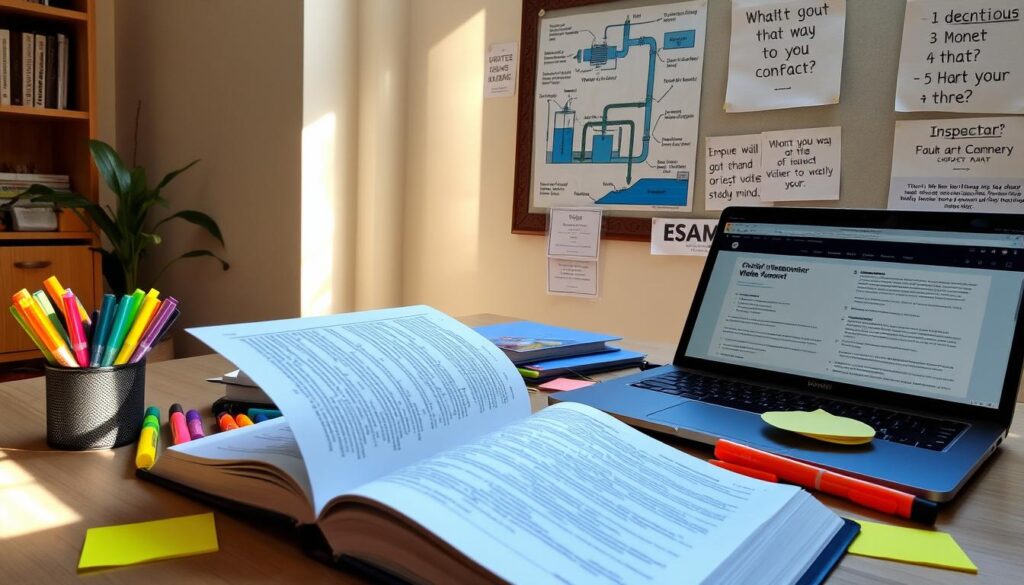Getting your wastewater certification is key to a successful career in wastewater treatment. It’s important whether you’re experienced or new to the field. With the right study tips and resources, you can pass the certification exam with confidence.
This guide will give you effective ways to study for and pass your wastewater certification exam. We’ll cover everything from the exam’s scope and format to creating a study plan. You’ll get the tools you need to feel confident and successful in the certification process.

A confident individual studying in a modern classroom, surrounded by wastewater treatment diagrams, certification materials, and laboratory equipment. The scene includes a realistic representation of wastewater management processes, with visuals of treatment plants and clean water. Bright lighting highlights a determination to learn, reflecting a professional atmosphere focused on environmental sustainability.
Key Takeaways
- Understand the scope and eligibility requirements of the wastewater certification exam
- Familiarize yourself with the exam format and sections to develop a targeted study plan
- Grasp the intricacies of the wastewater treatment process, including primary and secondary treatment
- Ensure compliance with regulatory protocols and safety standards
- Utilize a variety of study resources, including textbooks, online materials, and practice tests
Understanding the Wastewater Certification Exam
Getting a wastewater certification is key for those wanting to work in water treatment. It’s important to know what the exam covers and who can take it. The exam tests your knowledge in wastewater treatment, following rules, and safety.
Scope and Eligibility Requirements
The exam checks if you know your stuff in wastewater management. You need to meet certain education and experience levels to take the exam. These can include school, training, and work experience, depending on the certification you want.
Exam Format and Sections
The exam has multiple-choice questions on different parts of wastewater treatment and management. It’s split into sections, each covering a specific topic. These sections include:
- Wastewater Treatment Processes: This part tests your grasp of primary, secondary, and advanced treatment methods and the science behind them.
- Regulatory Compliance: You’ll show you know the laws and rules for wastewater management, like protecting the environment and keeping things safe.
- Maintenance and Operations: This section sees if you can run and keep wastewater facilities working well, including fixing equipment and making processes better.
- Laboratory Analysis: Here, you’ll show you can do water quality tests and understand the results to meet legal standards.
Knowing what the exam covers, who can take it, and how it’s structured will help you study better. This will boost your chances of passing the exam.
How to Study for Wastewater Certification
Getting ready for your wastewater certification exam requires a good study plan. We’ll share tips on organizing your study materials and using active learning methods. These tips will help you prepare well for the exam.
Start by making a structured study plan. First, list the main topics in the exam. Then, focus on the areas you need to work on the most. Finally, set aside time for each topic. This way, you can learn the material step by step and remember it better.
Using active learning is also a great idea. Don’t just read the material passively. Make practice questions, diagrams, or flashcards to engage with the content. This method helps you understand the topics better and gets you ready for the exam format.
- Practice sample questions and take mock exams to get used to the exam’s structure. This will show you where you need to focus your studying.
- Use online resources like study guides and webinars to help your learning. They keep you updated with the latest in the field.
- Talk to other professionals in the field online or at networking events. Discuss the material and share tips on studying.
Remember, consistency and dedication are key to passing your certification exam. Set aside a little time each day for studying. This way, you’ll build a strong knowledge base and feel confident for the exam.
“Effective study habits are the foundation of success in any certification exam. Approach your preparation with a strategic mindset, and you’ll be well on your way to becoming a certified wastewater professional.”
Mastering the Wastewater Treatment Process
Wastewater treatment is key to keeping our water safe and clean. To pass the wastewater certification exam, you need to know the main steps. We’ll cover primary and secondary treatment to help you understand this important topic.
Primary Treatment
The first step in treating wastewater is removing big solids and debris. This is the primary treatment stage. It’s the base for the next steps in cleaning the water. Screening, sedimentation, and grit removal are used to clean the water.
Secondary Treatment
After primary treatment, the water goes through secondary treatment. This stage removes dissolved and suspended organic matter. Biological processes like activated sludge or trickling filters are used. Knowing about these methods helps you understand wastewater treatment better.
| Treatment Stage | Key Processes | Contaminant Removal |
|---|---|---|
| Primary Treatment | ScreeningSedimentationGrit removal | Larger solids, debris, and coarse materials |
| Secondary Treatment | Biological processes (e.g., activated sludge, trickling filters) | Dissolved and suspended organic matter |
Learning about primary and secondary treatment helps you understand the wastewater treatment process. You’ll be ready for the certification exam questions on this topic.
“Effective wastewater treatment is not just an environmental necessity, but a fundamental responsibility to ensure the sustainability of our water resources.”
Regulatory Compliance and Safety Protocols
In the world of wastewater management, following rules and keeping things safe is key. As a wastewater pro, knowing about wastewater regulations and safety steps is a must. This part will give you the info and tools to handle these important areas with ease.
Wastewater treatment places are watched closely by groups like the Environmental Protection Agency (EPA) and state agencies. Following wastewater regulations is a must by law and key for protecting the environment and public health. Knowing the Clean Water Act, the National Pollutant Discharge Elimination System (NPDES), and other laws is vital for your wastewater certification test.
Your safety in the wastewater field is also very important. Using the right personal protective gear (PPE), handling hazardous materials safely, and having emergency plans are key for a safe work area. Knowing these safety steps keeps you and your team safe and shows you care about environmental compliance and handling wastewater right.
Getting good at following rules and safety steps prepares you to move forward in the wastewater industry with confidence. It shows you’re ready for the wastewater certification test. Remember, sticking to rules and safety is key for managing wastewater in a responsible and sustainable way.
Utilizing Study Resources Effectively
There are many study resources for the wastewater certification exam. It can feel overwhelming. But, using the right textbooks, online materials, practice tests, and study guides can help you learn better. This increases your chances of passing the exam.
Textbooks and Online Materials
Textbooks are a key part of studying for the wastewater exam. “Wastewater Engineering: Treatment and Reuse” by Metcalf & Eddy is a top choice. Online resources like webinars, video tutorials, and blogs can also help you understand important topics better.
Practice Tests and Study Guides
Practice tests and study guides are also crucial. They let you practice the exam format. This helps you see what you’re good at and what you need to work on. It also helps you learn how to answer different types of questions.
| Resource | Description | Availability |
|---|---|---|
| Wastewater Textbooks | Comprehensive coverage of wastewater treatment processes and regulations | Available in print and digital formats from various publishers |
| Online Wastewater Materials | Webinars, video tutorials, and industry blogs covering a wide range of wastewater topics | Accessible through various online platforms and industry websites |
| Wastewater Practice Tests | Simulated exams that mirror the format and content of the actual certification exam | Offered by professional associations and exam preparation providers |
| Wastewater Study Guides | Comprehensive review materials that summarize key concepts and provide test-taking strategies | Available in print and digital formats from various publishers and exam preparation providers |
Using this variety of wastewater certification study resources helps you understand the subject well. It also boosts your confidence for the exam.
“Preparation is the key to success in any endeavor, and the wastewater certification exam is no exception. By utilizing the right study resources, you’ll be equipped to tackle the exam with confidence and determination.”
Developing a Personalized Study Plan
Creating a study plan tailored to you is the best way to pass your wastewater certification exam. It should match your learning style and fit your schedule. This approach helps you prepare better and increases your chances of doing well. Let’s look at how to make a great wastewater certification study plan.
Assess Your Current Knowledge
First, check what you already know about wastewater treatment and the rules. Know your strong points and what you need to work on. This helps you focus your studies on the most important areas.
Determine Your Learning Style
Do you learn better with pictures and diagrams or through practical examples? Knowing how you like to learn helps you make a personalized study plan that works best for you. This way, you’ll remember and understand the material better.
Prioritize Key Topics
Look at the exam’s topics and decide which ones are most important. Spend more time on the tough ones and quickly go over the easy ones. This method makes your study plan for wastewater exam more effective.
Create a Realistic Schedule
Make a study schedule that fits your work and personal life. Set aside time for studying, practicing, and reviewing. Sticking to a regular study plan helps you remember the information better and boosts your confidence.
“Failing to plan is planning to fail. A personalized study plan is your key to conquering the wastewater certification exam.” – John Doe, Wastewater Treatment Expert
By taking these steps, you’ll have a wastewater certification study plan that suits you. Stick to it, and you’ll be ready to get your wastewater certification with confidence.

A visually engaging study plan for wastewater certification, featuring a colorful calendar with marked study days, a desk cluttered with textbooks and notebooks on water treatment, diagrams of wastewater processes, and various study materials like flashcards and highlighters, all set against a serene backdrop of a laboratory or classroom environment.
Time Management Strategies for Busy Professionals
As a busy professional, finding time for the wastewater certification exam can seem hard. But, with good time management, you can study more efficiently and reach your goal. Here are some tips to make a study schedule that fits your life.
Creating a Study Schedule
Creating a study schedule is key to doing well. Start by looking at your daily routine and finding time to study. Here’s how to make a study plan that works:
- Prioritize your commitments: Look at your work, family, and personal life to find the best times for studying.
- Set achievable goals: Break your study materials into smaller parts and set deadlines for each one.
- Allocate dedicated study time: Choose specific hours or days for focused study, and keep them free from distractions.
- Incorporate breaks and rest: Make sure your schedule has regular breaks to avoid burnout and keep your energy up.
- Review and adjust as needed: Check your study plan often and change it if your routine or progress changes.
With a structured yet flexible study schedule, you can manage your time well and stay on top of your wastewater certification preparation. Being consistent and committed is crucial for reaching your goals.
“Time management is not just about getting more things done, it’s about getting the right things done.” – Peter Drucker
Using these time management tips can help busy professionals like you improve your study efforts and pass the wastewater certification exam. Stay focused, stay organized, and keep moving forward to ace your wastewater certification.
Test-Taking Strategies and Techniques
Getting good at the wastewater certification exam is more than just knowing the material. It’s important to have strong test-taking strategies. We’ll look at ways to help you feel confident and do your best on the exam day.
One key tip is to stay calm under pressure. Exams can make you feel stressed, but by relaxing and managing your time well, you can reduce anxiety. Knowing test-taking tips for wastewater exam also makes it easier to handle different types of questions.
Managing your time well is also crucial. Make a plan to use your time wisely, so you can finish each part of the exam without rushing. Practice with wastewater exam preparation techniques like timed tests to learn how to quickly focus on the most important questions.
Lastly, using smart guessing strategies can help too. If you’re not sure of an answer, try eliminating options to guess the right one. By using these wastewater certification exam strategies, you’ll be ready to do great on the exam and reach your career goals.
| Test-Taking Strategies | Benefits |
|---|---|
| Stay Calm Under Pressure | Minimize anxiety, improve focus |
| Develop Time Management Skills | Complete the exam within the allotted time |
| Utilize Smart Guessing Techniques | Increase chances of selecting correct answers |

A serene study environment featuring an open textbook on wastewater management, surrounded by colorful highlighters, sticky notes, and a laptop displaying a practice exam. In the background, a bulletin board filled with diagrams of water treatment processes and inspirational study quotes. Soft, natural lighting streams through a nearby window, casting gentle shadows across the scene.
“Preparation is the key to success. By mastering the content and employing effective test-taking strategies, you’ll be well on your way to passing the wastewater certification exam with flying colors.”
Continuing Education and Professional Development
Your wastewater certification is just the start of your career growth. It’s important to keep learning to stay ahead. You need to get better at what you do and keep up with new tech and rules.
Going for advanced certifications and training is a great way to grow. You can learn more about wastewater treatment, rules, and new ways to do things. This can lead to new job chances and make you more valuable to your team.
But it’s not all about school. Talking with other people in the field is also key. Going to events, joining groups, and meeting others can give you new ideas and support. It helps you know what’s new, share tips, and find new paths in your career.
Frequently Asked Questions
What is the scope and eligibility requirements for the wastewater certification exam?
The exam covers topics like wastewater treatment, rules, and safety. You need certain education, work experience, and certifications to take it.
What is the format of the wastewater certification exam?
The exam has different sections on topics like treatment and safety. You’ll see questions in various formats, like multiple-choice and true/false.
How can I effectively study for the wastewater certification exam?
Creating a study plan is key. Organize your materials, use active learning, and practice with tests and guides.
What are the key components of the wastewater treatment process that I need to master?
Knowing primary and secondary treatment is crucial. This includes understanding the principles and how these stages work.
What regulatory compliance and safety protocols do I need to be familiar with?
You need to know about laws, safety, and compliance. This includes environmental rules and safety steps for wastewater work.
What study resources are available to help me prepare for the wastewater certification exam?
There are many resources like textbooks and online materials. Using these well can boost your learning and exam success.
How can I develop a personalized study plan for the wastewater certification exam?
Make a study plan that fits your learning style and schedule. Focus on important topics, set regular study times, and adjust as needed.
What time management strategies can I use as a busy professional studying for the wastewater certification exam?
Good time management is crucial for balancing work and studying. Use a realistic schedule, focus on what’s important, and avoid distractions.
What test-taking strategies and techniques can I use to perform well on the wastewater certification exam?
Improve your exam performance with strategies like managing time and staying calm. Also, use smart guessing to help you.
How can I continue my education and professional development after obtaining my wastewater certification?
Keep learning and growing in your career by getting more certifications, going to conferences, and networking with others in the field.